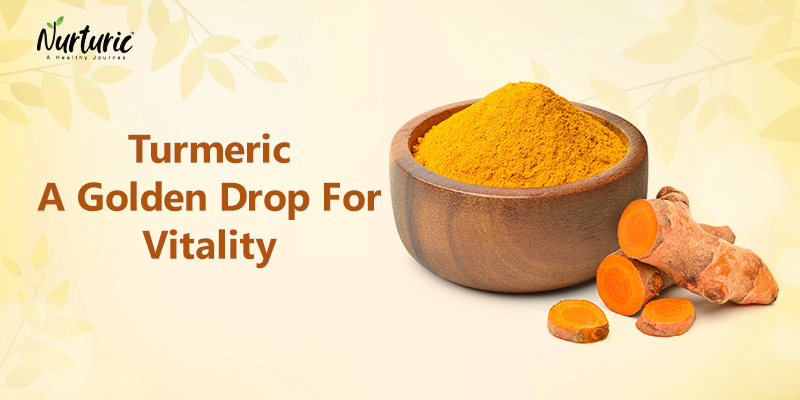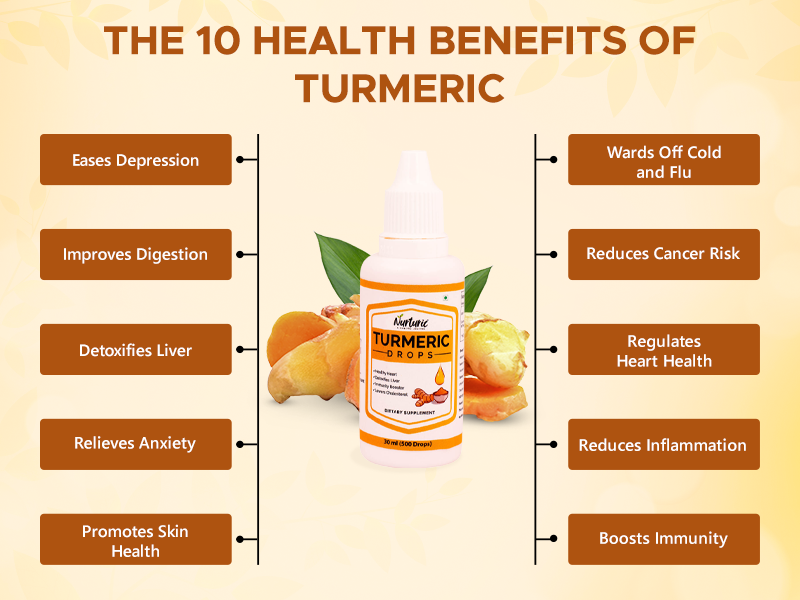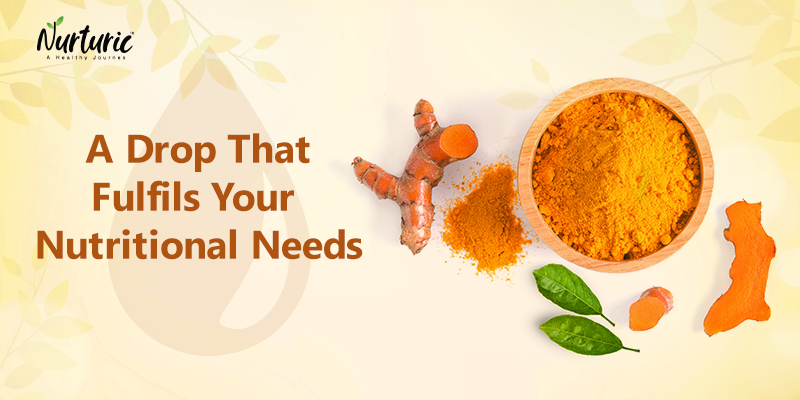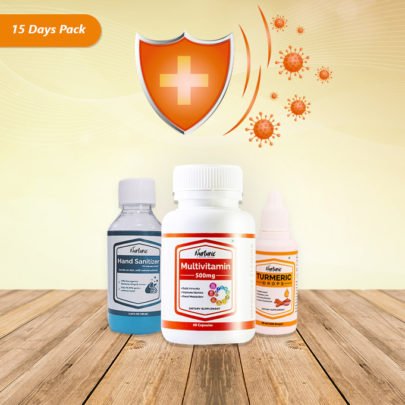- You have no items in your shopping cart
- Subtotal: ₹0.00
Turmeric is a golden spice that comes from the root of Curcuma longa, a powerful anti-inflammatory herb used to treat various ailments and widely used in Indian cuisine. However, as previously stated, the use of turmeric is not limited to the culinary world.  For centuries, Ayurveda has used turmeric, both in fresh and dried form, to promote health. It has also been used as medicine in places like India and China to treat breathing problems and as an antiseptic for treating wounds. Turmeric has recently been promoted as a cancer-fighting superfood.
For centuries, Ayurveda has used turmeric, both in fresh and dried form, to promote health. It has also been used as medicine in places like India and China to treat breathing problems and as an antiseptic for treating wounds. Turmeric has recently been promoted as a cancer-fighting superfood.
Now let’s dig deeper to know more about turmeric and curcumin and how does turmeric help your body
What are Turmeric and Curcumin?
Turmeric is an ancient superfood that has been used as both a herb and a cooking ingredient for centuries and used as a natural remedy for various complications. Curcumin is the primary bioactive polyphenol in turmeric, and it has anti-inflammatory effects and the potential to boost the number of antioxidants produced by the body.
Curcumin is one of the most powerful antioxidants, which can stabilize oxidative damage, the reason behind ageing. In addition, it blocks the free radicals of oxidants that are responsible for other diseases.
Now that we know more about Turmeric and Curcumin, let us see the10 health benefits of Turmeric Haldi.
The 10 Health Benefits of Turmeric
Curcuma longa, a plant native to India and Southeast Asia, produces turmeric and is sometimes called Indian Saffron due to its beautiful golden colour. Some studies mention it as a healing plant, with Susruta’s Ayurvedic Compendium (250 B.C.E.) mentioning it as an essential ointment ingredient for relieving the effects of food poisoning.  Turmeric’s first uses were recorded as part of India’s Vedic culture, and more than two thousand years later, it appeared in China, followed by East Africa a hundred years later. Now that you know about the origin of turmeric, let’s get into its benefits.
Turmeric’s first uses were recorded as part of India’s Vedic culture, and more than two thousand years later, it appeared in China, followed by East Africa a hundred years later. Now that you know about the origin of turmeric, let’s get into its benefits.
-
Eases Depression
The active agent in turmeric curcumin boosts brain-derived neurotrophic factor levels, thus helping patients with depression. The active agent in turmeric and other antioxidants scavenge free radicals that cause inflammation and reduce oxidative stress. The versatility of active compounds in turmeric drop reduces beta-amyloid plaque, neuroinflammation and the development of Alzheimer’s disease.
-
Improves Digestion
Turmeric’s curcumin reduces bloating and helps the digestive system get back on track and stimulates bile production in the gallbladder, and also aids in the prevention and treatment of pancreatitis. Instead of making drastic dietary changes to get all the nutrients required, start adding a tablespoon or drop of turmeric to your daily diet.
-
Detoxifies Liver
A healthy liver is essential for good physical and mental health. The liver’s detoxification involves removing toxins from the blood and metabolising nutrients to ensure that our bodies receive what they require. Curcumin can limit liver damage caused by harmful substances by interfering with inflammatory pathways. It also increases bile production and helps the gallbladder empty itself, which aids in the elimination of waste from the body.
-
Relieves Anxiety
Turmeric is the best choice if you are suffering from anxiety. These healing herbs are known for their ability to keep you calm under pressure and increase your resistance to stress. Turmeric accomplishes this by normalising cortisol, a stress hormone and increasing serotonin levels, a happy hormone.
-
Promotes Skin Health
Turmeric is a potent anti-ageing agent with anti-inflammatory properties, combined with a high concentration of antioxidants, making it extremely effective in treating various skin conditions, preventing wrinkles and fine lines and promoting a radiant glow.
-
Wards Off Cold and Flu
Traditionally, Golden milk/turmeric milk has been used to treat colds, congestion, headaches and sore throats. Curcumin, the active compound of turmeric, also has essential antiviral properties that can treat or prevent influenza infections and has been a powerful immunomodulatory agent over the last two decades. In addition, it can also be used to eliminate chest congestion, especially for people who suffer from chronic cough.
-
Reduces Cancer Risk
Turmeric reduces the production of cancerous and precancerous cells. According to one study, it slows the progression of prostate cancer and prevents the formation of new cancerous cells. The active compounds in turmeric effectively fight leukaemia cells and prevent cancer from spreading from its primary site to other body parts.
-
Regulates Heart Health
Turmeric, which is derived from the roots of ginger family plants, is found in every Indian household. It has anti-atherosclerosis properties, which basically keeps arteries from narrowing and allows continuous blood flow to the heart muscle.
Because of its anti-inflammatory properties, it prevents blood clotting or thickening, which is one of the primary causes of a heart attack and lowers the likelihood of insulin resistance. It promotes cardiac tissue repair, contributes significantly to post-bypass surgery treatments, and aids in regulating cholesterol levels.
-
Reduces Inflammation
Due to its anti-inflammatory properties, turmeric can aid in managing chronic conditions such as inflammation, joint pain, and stiffness. Inflammation depends upon the immune system’s response to injury or pathogens. To give your body the best chance of fully absorbing natural curcumin, eat your turmeric with black pepper or consume turmeric drops.
-
Boosts Immunity
Our immune system, which constantly fights to protect the body from infection and disease, plays a significant role in overall health. Turmeric’s anti-inflammatory properties allow it to boost the immune system naturally and cleanses the blood vessels and tissues of all toxins. As a result, this magical drink is beneficial in boosting immunity and fighting diseases.
These are some of the advantages of turmeric powder that give the body the extra boost it needs to fight disease and a wide range of conditions. Its numerous properties include mental and emotional health benefits and those that contribute to a more functional body. Let us now talk about who needs Turmeric and what conditions it can treat or prevent.
Who Needs It – Which Conditions Can It Treat or Prevent
Turmeric drops have anti-inflammatory and antioxidant properties, which make them extremely beneficial for health. It should be included in any healthy diet for various reasons, including lowering the risk of developing cardiovascular disease and possibly preventing certain cancers.
Let us see what conditions it can prevent or treat
- Alzheimer’s Disease
- Colorectal Cancer
- Depression
- Stomach Ulcers
- Diabetes
- Irritable Bowel Syndrome
- Joint Pain
- Prostate Cancer
It is critical to understand that turmeric is not a cure for chronic conditions, but curcumin’s unique medicinal properties have significant health benefits and applications in modern natural medicine. Now that you have seen the benefits of turmeric and what conditions turmeric can prevent, let us look at the tips and precautions you should take when adding Turmeric Drops to your diet.
Now that you have seen the benefits of turmeric and what conditions turmeric can prevent, let us look at the tips and precautions you should take when adding Turmeric Drops to your diet.
How to Use It – Tips and Precautions
Turmeric is a natural immunity booster packed with antioxidant and anti-inflammatory properties and nutrients that ward off seasonal infections and reduce inflammation. When deciding whether or not to try turmeric, it is important to proceed with caution. Let us look at the tips and precautions to be taken care of and who should avoid consuming turmeric.
- If you have gastroesophageal reflux disease
- If you have gallbladder issues
- If you have diabetes
- If you are experiencing infertility problems
- If you have an iron deficiency
- If you have uterine cancer
- If a woman has ovarian cancer
Now that we have seen what precautions need to be taken while incorporating turmeric into our diet, let us see the possible side effects of turmeric.
Possible Side Effects
Turmeric is generally thought to be safe in low doses. Even though there are no known allergies or side effects associated with turmeric, certain medications and pre-existing conditions can cause side effects. Let us look at some of the negative consequences of excessive consumption.
- Stomach Upset
- Nausea
- Dizziness
- Diarrhoea
- Blurred Vision
- Headache
These side effects are rare and usually a result of overconsumption. Always consume the supplement in moderation and contact your doctor if you observe any of the above symptoms. Now that we have talked about the side effects and importance of turmeric drops, let us see how turmeric fulfils our nutritional needs when we consume it regularly.
Now that we have talked about the side effects and importance of turmeric drops, let us see how turmeric fulfils our nutritional needs when we consume it regularly.
Nutritional Information and Ingredients – Background
Since ancient times turmeric has been used as a superfood as it contains approximately 29 nutrients in one teaspoon of ground turmeric powder. The herb contains essential oils that are beneficial to one’s health, such as turmerone, zingiberene. Turmeric is rich in calcium, iron, potassium, manganese, copper, zinc and magnesium. Now that you know the nutritional facts of turmeric, let’s look at how to choose the right supplement.
Now that you know the nutritional facts of turmeric, let’s look at how to choose the right supplement.
How to Choose the Right Supplement. Where to Buy It From
Turmeric root is available in most of the stores in India. Whether you choose to take turmeric or curcumin, make an effort to find a high-quality supplement. Cheaper supplements may contain fillers that contain allergenic ingredients, such as wheat. However, before investing in a turmeric or curcumin supplement, consult with your doctor to determine whether supplementation is actually safe and warranted.  If you are looking for a 100 % organic supplement with no side effects, buy Nurturic Turmeric Drops which are safe and also plant-based to reap all the benefits
If you are looking for a 100 % organic supplement with no side effects, buy Nurturic Turmeric Drops which are safe and also plant-based to reap all the benefits
Our Take
If you’re wondering, what is turmeric good for; The answer is almost everything. Because curcumin, turmeric’s main active ingredient, has been linked to many of its health benefits, you may want to consider taking it regularly.
FAQs:
1. How many turmeric drops are safe to consume every day?
It is recommended to take 10 drops twice a day.
2. Is turmeric bad for the kidney?
No. Turmeric in foods or as supplements are not harmful. But if people are prone to kidney stones they should be careful with turmeric supplements.
3. What are the side effects of turmeric drops?
It is recommended to be consumed in moderation. Excessive consumption leads to nausea, vomiting, headache, dizziness and bloating
4. Does turmeric help you lose belly fat?
Yes. The chemical composition of turmeric suppresses the fat growth tissues and helps in regulating blood pressure and prevents insulin resistance.
5. Is it safe to consume turmeric drops regularly?
Yes, turmeric drops are safe to be consumed regularly if taken within recommended limits.
6. Can turmeric milk increase immunity?
Yes. Turmeric is loaded with nutrients that boost the immune system. Consumption of turmeric milk can help you prevent infections, colds, flu and many other health issues.
7. Are turmeric drops safe for children?
Yes, but even though turmeric has no side effects it is recommended to consult a doctor before taking the supplement.
8. Is turmeric good for the skin?
Turmeric contains antioxidants and anti-inflammatory components which helps in reviving skin and give it a natural glow.
9. Is turmeric good for respiratory Infections?
Yes. Turmeric helps cleanse the respiratory tract naturally and wards off cold and flu due to its anti-inflammatory properties.
10. Is turmeric water good for health?
Yes. Tumeric water is a miracle drink for your heart. It can reduce bad cholesterol levels and prevents heart diseases.











